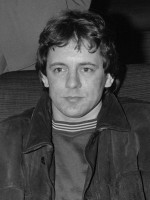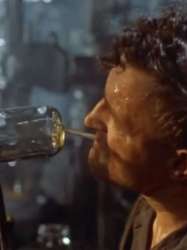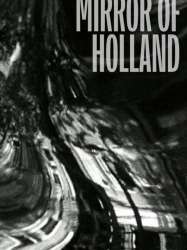Bert Haanstra is a Actor, Director, Scriptwriter, Producer, Co-Director, Director of Photography, Editor and Script Néerlandais born on 31 may 1916 at Rijssen-Holten (Pays-bas)
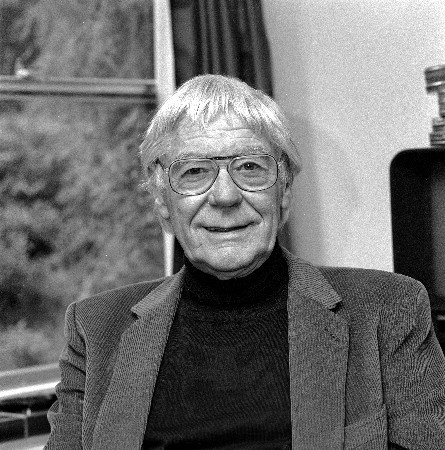
Bert Haanstra (31 May 1916 – 23 October 1997) was a Dutch film and documentary director.
Haanstra was born in the town of Holten and became a professional Dutch documentary film maker in 1947. He won international acclaim with his short documentary Spiegel van Holland / Mirror of Holland, for which he received the Grand Prix du court métrage at the Cannes-festival of 1951. During the fifties he made six films for Shell, among others The Rival World (1955) on insects spreading deadly diseases and how to fight them. In 1958 his documentary Glass, a filming improvisation made in a glass factory, won an Academy Award for Best Documentary Short Subject.
He directed several fiction films. Fanfare, a comedy situated in a small Dutch village, is still the Netherlands' second most popular film ever (measured at the box office), only surpassed by Paul Verhoevens Turkish Delight. Abroad however, Fanfare was hardly noticed, but it was entered into the 1959 Cannes Film Festival and the 1st Moscow International Film Festival.
In several shorts and in long documentaries like Alleman / The Human Dutch and Stem van het water / The Voice of the Water Haansta reflected on The Netherlands and its inhabitants. All these films made him one of the most popular filmmakers in the history of Dutch cinema. The documentary Alleman was seen in the cinema by 20 percent of the total Dutch population. In the seventies and eighties Haanstra addressed a new subject. He made several films about animals. In the long documentary Bij de beesten af / Ape and Super-Ape (1973), for which he collaborated with Frans de Waal and Jane Goodall, among others, he compared the behavior of animals and human beings. In total Haanstra received close to a hundred awards. He died in the town of Hilversum.
Haanstra was Officer in the Order of Orange-Nassau.
Bert Haanstra a également été scénariste, monteur, directeur de la photographie (de films qu'il a réalisé, la plupart du temps) et acteur (dans Amsterdamned de Dick Maas). Il a enfin été conseiller technique sur De Wisselwachter (L'Aiguilleur de Jos Stelling).
Source : Wikidata
Bert Haanstra

Nationality Pays-bas
Birth 31 may 1916 at Rijssen-Holten (Pays-bas)
Death 23 october 1997 (at 81 years) at Hilversum (Pays-bas)
Awards Golden Calf
Birth 31 may 1916 at Rijssen-Holten (Pays-bas)
Death 23 october 1997 (at 81 years) at Hilversum (Pays-bas)
Awards Golden Calf
Haanstra was born in the town of Holten and became a professional Dutch documentary film maker in 1947. He won international acclaim with his short documentary Spiegel van Holland / Mirror of Holland, for which he received the Grand Prix du court métrage at the Cannes-festival of 1951. During the fifties he made six films for Shell, among others The Rival World (1955) on insects spreading deadly diseases and how to fight them. In 1958 his documentary Glass, a filming improvisation made in a glass factory, won an Academy Award for Best Documentary Short Subject.
He directed several fiction films. Fanfare, a comedy situated in a small Dutch village, is still the Netherlands' second most popular film ever (measured at the box office), only surpassed by Paul Verhoevens Turkish Delight. Abroad however, Fanfare was hardly noticed, but it was entered into the 1959 Cannes Film Festival and the 1st Moscow International Film Festival.
In several shorts and in long documentaries like Alleman / The Human Dutch and Stem van het water / The Voice of the Water Haansta reflected on The Netherlands and its inhabitants. All these films made him one of the most popular filmmakers in the history of Dutch cinema. The documentary Alleman was seen in the cinema by 20 percent of the total Dutch population. In the seventies and eighties Haanstra addressed a new subject. He made several films about animals. In the long documentary Bij de beesten af / Ape and Super-Ape (1973), for which he collaborated with Frans de Waal and Jane Goodall, among others, he compared the behavior of animals and human beings. In total Haanstra received close to a hundred awards. He died in the town of Hilversum.
Haanstra was Officer in the Order of Orange-Nassau.
Biography
Bert Haanstra s'installe comme photographe à Amsterdam en 1934 puis devient réalisateur en 1947. Son court-métrage documentaire Spiegel van Holland (Miroirs de Hollande) reçut plusieurs récompenses dont le Grand Prix du court métrage au festival de Cannes de 1951. Il réalise six films pour Shell durant les années 1950. Son documentaire Glas (Verre), une improvisation filmique tournée dans une verrerie, gagne l'Oscar du meilleur court-métrage documentaire en 1958. Bert Haanstra a également réalisé des films de fiction dont Fanfare , une comédie qui est encore aujourd'hui à la deuxième place du box office néerlandais derrière Turks fruit de Paul Verhoeven. Bert Haanstra a filmé les Pays-Bas et leurs habitants dans de nombreux documentaires dont Alleman (Monsieur Tout-le-Monde) and De Stem van het water qui ont fait de lui l'un des réalisateurs les plus populaires du cinéma néerlandais. Alleman (Monsieur Tout-le-Monde a été vu au cinéma par 20 % de la population des Pays-Bas. Bert Haanstra s'est tourné vers la réalisation de documentaires animaliers dans les années 1970. Il a ainsi collaboré avec Frans de Waal et Jane Goodall pour Bij de beesten af (Pire que les bêtes) (1973) dans lequel il comparait les comportements animaux et humains. Il a reçu 78 récompenses lors de sa carrière et avait été fait officier de l'ordre d'Orange-Nassau.Bert Haanstra a également été scénariste, monteur, directeur de la photographie (de films qu'il a réalisé, la plupart du temps) et acteur (dans Amsterdamned de Dick Maas). Il a enfin été conseiller technique sur De Wisselwachter (L'Aiguilleur de Jos Stelling).
Usually with
Filmography of Bert Haanstra (11 films)
Actor
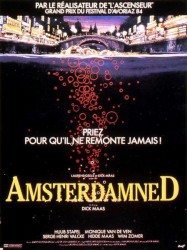
Amsterdamned (1988)
, 1h54Directed by Dick Maas
Origin Pays-bas
Genres Thriller, Action, Horror
Themes Seafaring films, Transport films, Underwater action films, Serial killer films
Actors Huub Stapel, Monique van de Ven, Jules Croiset, Tanneke Hartzuiker, Bert Haanstra, Lou Landré
Roles Conductor
Rating65%





Opening from his point of view, a murderer looks around the city of Amsterdam at night through the canals the city is famous for. He sneaks into a Chinese restaurant's backdoor and steals a butcher knife while the cooks weren't looking. The killer finds his first victim in a local prostitute, who after refusing advances from a cab driver, gets thrown out of the cab. A baglady watches from a distance as the killer plunges the knife into the hooker and drags her back into the water. The next morning, a tour boat on the canal collides with the body of the prostitute, who has been hung on one of the small bridges. As the tourists scream, the body drags on the top of the boat until an opening shows her bloodied body and face.

The Family of Chimps (1984)
, 55minutesDirected by Bert Haanstra
Genres Documentary
Themes Films about animals, Films about apes
Actors Bert Haanstra
Roles (voice)
Rating76%





Director

Zoo (2007)
, 1h20Directed by Bert Haanstra
Origin USA
Genres Documentary
Themes Films about animals, Films about sexuality, Films about horses, Mise en scène d'un mammifère
Actors Paul Eenhoorn
Rating54%






The Family of Chimps (1984)
, 55minutesDirected by Bert Haanstra
Genres Documentary
Themes Films about animals, Films about apes
Actors Bert Haanstra
Rating76%





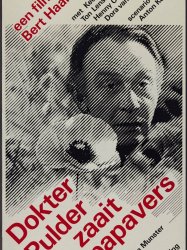
Dr. Pulder Sows Poppies (1975)
, 1h45Directed by Bert Haanstra
Genres Drama, Thriller
Actors Kees Brusse, Dora van der Groen
Rating68%





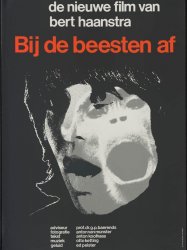
Ape and Super-Ape (1972)
, 1h44Directed by Bert Haanstra
Genres Documentary
Themes Documentaire sur une personnalité, Documentary films about nature
Actors Anton Koolhaas
Rating76%





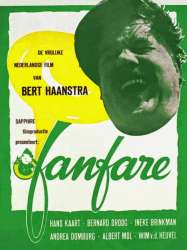
Fanfare (1958)
, 1h33Directed by Bert Haanstra
Genres Drama, Comedy, Musical
Actors Riek Schagen
Rating72%





Scriptwriter

Ape and Super-Ape (1972)
, 1h44Directed by Bert Haanstra
Genres Documentary
Themes Documentaire sur une personnalité, Documentary films about nature
Actors Anton Koolhaas
Roles Scenario Writer
Rating76%






Trafic (1971)
, 1h32Directed by Jacques Tati
Origin France
Genres Drama, Comedy
Themes Transport films, Films about automobiles, Road movies
Actors Jacques Tati, Franco Ressel
Rating69%





In Trafic, Hulot is a bumbling automobile designer who works for Altra, a Paris auto plant. He, along with a truck driver and a publicity agent, Maria, takes a new camper-car (designed by Hulot) to an auto show in Amsterdam. On the way there, they encounter various obstacles on the road. Some of the obstacles that Hulot and his companions encounter are getting impounded by Dutch customs guards, a car accident (meticulously choreographed by the filmmakers), and an inefficient mechanic. In the film, “Tati leaves no element of the auto scene unexplored, whether it is the after-battle recovery moments of a traffic-circle chain-reaction accident, whether it a study of drivers in repose or garage-attendants in slow-motion, the gas-station give-away (where the busts of historical figures seem to find their appropriate owners) or the police station bureaucracy.”

Everyman (1963)
, 1h30Directed by Bert Haanstra
Genres Documentary
Actors Peter Ustinov
Roles Co-Writer
Rating76%






Fanfare (1958)
, 1h33Directed by Bert Haanstra
Genres Drama, Comedy, Musical
Actors Riek Schagen
Roles Writer
Rating72%





 Connection
Connection




